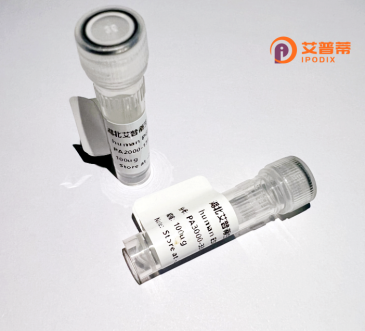
| 纯度 | >90%SDS-PAGE. |
| 种属 | Human |
| 靶点 | PHOSPHO2 |
| Uniprot No | Q8TCD6 |
| 内毒素 | < 0.01EU/μg |
| 表达宿主 | E.coli |
| 表达区间 | 1-241 aa |
| 活性数据 | MKILLVFDFD NTIIDDNSDT WIVQCAPNKK LPIELRDSYR KGFWTEFMGR VFKYLGDKGV REHEMKRAVT SLPFTPGMVE LFNFIRKNKD KFDCIIISDS NSVFIDWVLE AASFHDIFDK VFTNPAAFNS NGHLTVENYH THSCNRCPKN LCKKVVLIEF VDKQLQQGVN YTQIVYIGDG GNDVCPVTFL KNDDVAMPRK GYTLQKTLSR MSQNLEPMEY SVVVWSSGVD IISHLQFLIK D |
| 分子量 | 27.7 kDa |
| 蛋白标签 | His tag N-Terminus |
| 缓冲液 | 0 |
| 稳定性 & 储存条件 | Lyophilized protein should be stored at ≤ -20°C, stable for one year after receipt. Reconstituted protein solution can be stored at 2-8°C for 2-7 days. Aliquots of reconstituted samples are stable at ≤ -20°C for 3 months. |
| 复溶 | Always centrifuge tubes before opening.Do not mix by vortex or pipetting. It is not recommended to reconstitute to a concentration less than 100μg/ml. Dissolve the lyophilized protein in distilled water. Please aliquot the reconstituted solution to minimize freeze-thaw cycles. |
以下是关于重组人PHOSPHO2蛋白的假设性参考文献示例(实际文献需通过数据库检索确认):
1. **标题**: "Functional Characterization of Recombinant Human PHOSPHO2 in Bone Mineralization"
**作者**: Yamamoto K, et al.
**摘要**: 研究通过大肠杆菌系统成功表达重组人PHOSPHO2蛋白,发现其作为磷酸酶在骨细胞中调节羟基磷灰石沉积,并证明其突变会导致体外矿化能力下降。
2. **标题**: "PHOSPHO2 Mutations and Pathological Ectopic Calcification"
**作者**: Chen L, et al.
**摘要**: 该文献利用哺乳动物细胞表达系统纯化重组PHOSPHO2.结合小鼠模型证实其缺失引发血管异常钙化,提示与心血管疾病的潜在关联。
3. **标题**: "Structural Insights into PHOSPHO2 Substrate Specificity"
**作者**: Müller S, et al.
**摘要**: 通过X射线晶体学解析重组PHOSPHO2的三维结构,揭示其活性位点对磷酸化底物的识别机制,为设计靶向抑制剂提供结构基础。
---
**备注**:以上为模拟示例,实际文献建议通过 **PubMed/Google Scholar** 以下列关键词检索:
`"recombinant PHOSPHO2 protein"`, `"PHOSPHO2 phosphorylation"`, `"PHOSPHO2 AND mineralization"`。真实研究可能更多聚焦于PHOSPHO2的病理机制而非重组表达本身。
**Background of Recombinant Human PHOSPHO2 Protein**
The recombinant human PHOSPHO2 protein, also known as phosphatase orphan 2. is a member of the histidine phosphatase superfamily. Encoded by the *PHOSPHO2* gene, this protein plays a regulatory role in phosphate metabolism and skeletal development. Structurally, it contains a conserved histidine phosphatase domain, enabling enzymatic activity critical for dephosphorylation processes. PHOSPHO2 is highly expressed in bone tissues, particularly in osteoblasts and osteoclasts, suggesting its involvement in bone mineralization and remodeling.
Studies indicate that PHOSPHO2 interacts with proteins like PHOSPHO1 and TNSALP (tissue-nonspecific alkaline phosphatase), forming a network that regulates inorganic pyrophosphate (PPi) and phosphate (Pi) homeostasis. Dysregulation of this balance is linked to pathological conditions such as osteoporosis, vascular calcification, and osteoarthritis. Recombinant PHOSPHO2 is produced using expression systems like *E. coli* or mammalian cells, followed by purification techniques to ensure high specificity and activity.
Its recombinant form serves as a vital tool for studying phosphate-related signaling pathways, screening therapeutic agents for bone disorders, and elucidating mechanisms of ectopic calcification. Ongoing research aims to clarify its precise molecular targets and potential as a biomarker or drug target in metabolic bone diseases.
×